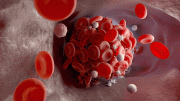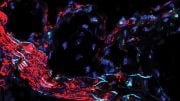
Heart disease, also known as cardiovascular disease, is a leading cause of death worldwide. It refers to a group of conditions that affect the heart and blood vessels, including coronary artery disease, heart failure, and arrhythmias.
Research has identified suPAR as a protein that contributes to the development of atherosclerosis and kidney disease, offering new opportunities for treatment.
Traditionally, clinicians have approached the treatment of cardiovascular disease by controlling diabetes and blood pressure, and utilizing medications such as aspirin and statins to lower cholesterol.
However, heart disease continues to be the leading cause of death in the United States. Even when risk factors are managed, many patients still experience heart attacks, according to Salim Hayek, M.D., physician-scientist and medical director of the University of Michigan Health Frankel Cardiovascular Clinics.
But a study led by Michigan Medicine has uncovered a protein produced by the immune system that causes atherosclerosis – the hardening of arteries that affects over a billion people worldwide – which offers the promise of new treatments.
“Targeting the immune component central to the development of atherosclerosis is the Holy Grail for the treatment of heart disease,” said Hayek, senior author of the study “This is the first time that a component of the immune system is identified that meets all the requirements for being a promising treatment target for atherosclerosis.”
This protein, called soluble urokinase plasminogen activator receptor, or suPAR, is produced by the bone marrow. It acts as a regulator, essentially a thermostat for the activity of the immune system, or “immunostat”.
Past studies have shown suPAR to be a marker of cardiovascular disease. But this study, published in the Journal of Clinical Investigation, is the first evidence showing that the protein actually causes atherosclerosis when at high levels.
Three-pronged findings
First, the research team analyzed the Multi-Ethnic Study of Atherosclerosis, which consists of over 5,000 people without known cardiovascular disease and found that those who had higher suPAR levels were much more prone to develop atherosclerosis and experience cardiovascular events, regardless of their underlying risk factors.
Then, the investigators did a genetic study of 24,000 people to find whether certain genetic variations affected levels of suPAR in blood. They discovered a specific variant in the gene PLAUR that codes for suPAR, and people with that genetic variant tended to have higher suPAR levels. Most importantly, that genetic variant was linked to atherosclerosis in a Mendelian randomization analysis of 500,000 participants in the UK Biobank, which was replicated in two other large data sets.
“We also found that participants lacking a copy of the PLAUR gene have a lower risk of heart disease,” said first author and geneticist George Hindy, M.D., Ph.D., of Regeneron Genetics Center. “Altogether, the genetic data is truly compelling for high suPAR being a cause of atherosclerosis.”
Finally, in mouse models with high suPAR levels, researchers saw a dramatic increase in atherosclerotic plaques of mouse aortas compared to mice with normal suPAR levels.
“Even prior to developing atherosclerosis, the mouse aortas with high suPAR levels contained more inflammatory white blood cells, and the immune cells circulating in the blood were in an activated state, or ‘attack-mode,’” said Daniel Tyrrell, Ph.D., co-first author and research fellow at the U-M Health Frankel Cardiovascular Center. “High suPAR levels appear to activate the immune cells and prime them to overreact to the high cholesterol environment, causing these cells to enter the blood vessel wall and accelerate the development of atherosclerosis.”
What is unique about this study, Hayek says, is that it brings to light high-quality clinical, genetic, and experimental data – all pointing to suPAR as a cause of atherosclerotic disease.
“Now, we’re looking into developing treatments to reduce suPAR levels safely as a strategy to prevent and treat heart disease, especially since traditional therapies for atherosclerosis have no impact on suPAR,” he said.
suPAR linking kidney and cardiovascular disease
The study dovetails findings that suPAR is known to be a pathogenic factor that causes kidney disease, which impacts one in seven Americans. People often experience the two conditions together: two-thirds of people with kidney disease are affected by cardiovascular disease, and over 40% of patients with cardiovascular disease have signs of kidney disease.
“This paper places suPAR as the link between kidney and cardiovascular disease; a common factor causing both through this inappropriate, persistent activation of the immune system,” said co-author Jochen Reiser, M.D., Ph.D., chair of the Department of Medicine at Rush University and an expert in the study of suPAR. “This is pointed out in the Mendelian randomization genetic analysis done by the investigators, showing that high suPAR is also linked to kidney disease.”
For both conditions, suPAR has long been known as a biomarker for poor outcomes and disease progression. In a 2020 study, Hayek’s team found that suPAR can worsen acute kidney injury and that blocking suPAR prevents it. A recent study led by Hayek found that levels of protein are high in patients with heart failure and predict death for patients.
Research into suPAR’s role in health and disease has advanced rapidly in the past 10 years. Hayek says suPAR has great potential to be a successful treatment target for cardiovascular and kidney disease. His lab has already begun work designing anti-suPAR therapies and planning clinical trials.
“My hope is that we are able to provide these treatments to our patients within the next three to five years,” he said. “This will be a game changer for the treatment of atherosclerotic and kidney disease”.
Reference: “Increased soluble urokinase plasminogen activator levels modulate monocyte function to promote atherosclerosis” by George Hindy, Daniel J. Tyrrell, Alexi Vasbinder, Changli Wei, Feriel Presswalla, Hui Wang, Pennelope Blakely, Ayse Bilge Ozel, Sarah Graham, Grace H. Holton, Joseph Dowsett, Akl C. Fahed, Kingsley-Michael Amadi, Grace K. Erne, Annika Tekmulla, Anis Ismail, Christopher Launius, Nona Sotoodehnia, James S. Pankow, Lise Wegner Thørner, Christian Erikstrup, Ole Birger Pedersen, Karina Banasik, Søren Brunak, Henrik Ullum, Jesper Eugen-Olsen, Sisse Rye Ostrowski, on behalf of the DBDS Consortium, Mary E. Haas, Jonas B. Nielsen, Luca A. Lotta, on behalf of the Regeneron Genetics Center, Gunnar Engström, Olle Melander, Marju Orho-Melander, Lili Zhao, Venkatesh L. Murthy, David J. Pinsky, Cristen J. Willer, Susan R. Heckbert, Jochen Reiser, Daniel R. Goldstein, Karl C. Desch and Salim S. Hayek, 4 October 2022, Journal of Clinical Investigation.
DOI: 10.1172/JCI158788
The study was funded by the National Heart, Lung, and Blood Institute (NHLBI), the Michigan Institute for Clinical & Health Research (MICHR), and the Gilead Sciences Research Scholar Program in Cardiovascular Disease.
Hayek and the University of Michigan have patents filed for the use of suPAR levels in the management of cardiovascular disease and the use anti-suPAR therapies as a strategy to prevent and treat atherosclerosis. Hayek and Reiser are scientific advisory board members of Walden Biosciences, a company devising therapeutics targeting suPAR in kidney disease. Hindy, Haas, Nielsen and Lotta receive salary, stocks and stock options from Regeneron Pharmaceuticals, Inc. Eugen-Olsen is a co-founder, shareholder, and chief scientific officer of Virogates and a named inventor on patents related to suPAR.








The article is silent which type of protein suPAR is actually causing Atherosclerosis. Whatever may be early solution is urgently required since most of the people are suffering this disease.